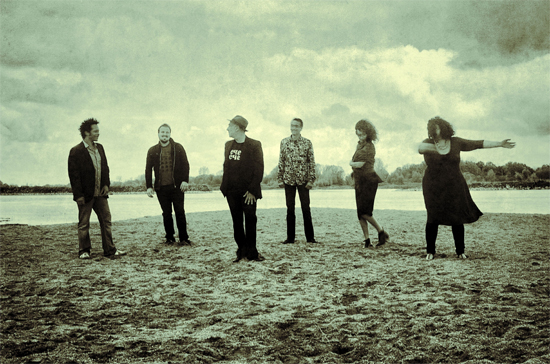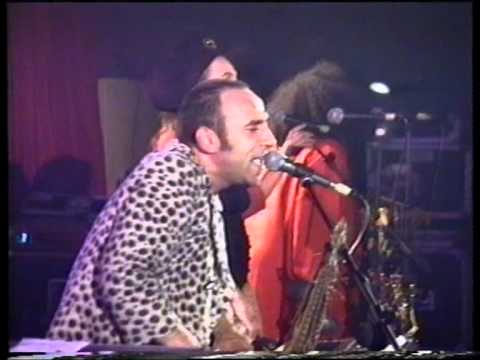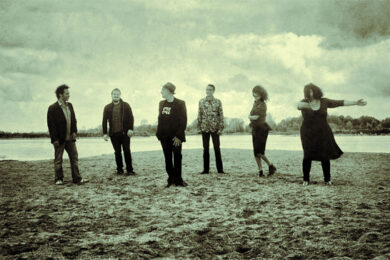The first things I remember hearing about Lo’Jo, a number of years ago, was that they lived together in a farm house outside Angers, in the French countryside. The music largely passed me by. So if their thirteenth album, Cinema El Mundo, happens to be your introduction to the group then we’re more or less in the same boat, arriving rather late to the party (a party you can only reach by boat, I suppose). I had them pegged as world melange specialists, which they certainly are – I just didn’t expect to find their particular fusion so successful, especially given just how much is wriggling around in here: chanson, reggae, gypsy folk, desert rock, jazz, various Arab and African musics; the six current members include singer, poet and figurehead Denis Pean, classically trained violinist Richard Bourreau, bassist Kham Meslien, drummer Baptiste Brondy and Berber sister singers Yamina and Nadia Nid El Mourid. But Cinema El Mundo also features all manner of guest performers, including Robert Wyatt, Tinariwen members Ibrahim and Eyadou and cellist Vincent Segal.
Pean says "I pictured it as a banquet that you invite people to." What’s nearly miraculous here is that it’s not a banquet that leaves you feeling stuffed and lethargic. I’m put in mind of some recent complaints about "post-everything" music, the fatigue that comes from excessive gorging on aural floss. Perhaps what your Animal Collectives are facing is that which has been a key issue for any number of world fusion groups for a longer period – how to stay nimble when you’re taking on so much musical and cultural weight. Lo’Jo have a number of factors on their side: they’ve been doing this for 30 years now and they’re not merely web-sourcing global sounds. Their touring has taken them into close contact with the musical cultures and practices they draw on – most notably their foray into the Sahara desert which resulted in them helping to organise the first Festival in the Desert in 2001, a launch-pad for Tinariwen. Another major asset on this record seems to be producer Jean Lamoot who, for all the commercial polish and control, is also adept at teasing out sonic details (Yamina and Nadia’s vocals rising like a mirage), applying some gorgeously bleached out, dubby effects. The finest tracks, like ‘Magnetik’, are crammed full of ideas and odd details (it starts with a lonely ring-modulated guitar twang and Pean seems to be singing through jelly) but still pointed and purposeful.
Pean himself, a published poet, gets compared to Tom Waits – there’s certainly a carnivalesque , though less savage, feel to ‘Zetwal’ on the album – and Johnny Cash, which I can also hear to a degree but it’s not as though there’s no precedent for gruff/tender singers in French musical history (Brassens?). In any case, he’s the one who has a way with words so he’s naturally the mouth-piece for the group.
The group has been together for 30 years now.
Denis Pean: I was 21 and I brought several friends together to experiment because I didn’t know anything really about being in a group, being a professional musician. The name evoked something that would come to fruition, and it still exists to this day, even though the people and the style have changed.
How many of you were there to begin with?
DP: It was four, five or six of us, we were a collective, it’s always been a collective, but now there are just two of the original members remaining.
How did Lo’Jo sound to begin with?
DP: When we started the group I was obsessed with not trying to be fashionable, I didn’t want to do what other people were doing… obsessively, pretentiously if you like, it was my vice. That’s what I wanted. We were very influenced by Anglo-Saxon music, I loved punk, the energy, the rawness, this primitive trance in the rhythms, but I transposed it into another type of music with other instruments, other sounds and other song styles, but this energy is present and it’s my culture, and I think it’s still in evidence.
Can you describe how you sounded in 1982 and is there a thread between that sound and what you’re doing now?
DP: The link is mostly a certain colour. I’ve always had a relationship with music through colour and if I suggest something to a musician it’s more likely to be a colour than a sequence of notes. I’m more like a director of photography, making sure that there’s the music has the right light on it, to create shadows, perspective. What remains of Lo’Jo is the idea that music is like a block that has to be sculpted. And we use whatever means we have at our disposal to achieve that because the players aren’t the same.
Are there any documents of Lo’Jo’s early music?
DP: No.
Because it was a long period between setting the group up and releasing a first record (Fils De Zamal in 1993)…
DP: It was a period of experimentation. We didn’t do a lot of live shows, we didn’t really have professional ambitions. It was about long musical trances in cellars or in lofts, we did a couple of gigs in small clubs, in art schools, at our parents’ places… but there wasn’t any real aim. We only started to a have a professional life when a circus invited us to join them going round Europe in a caravan.
Lo’Jo live in 1990 in a period when they were calling themselves Lo’Jo Triban
The 80s was the point where World Music was first being cooked up as a marketing category…
DP: I didn’t really hear about that at the beginning of the 80s, we were from the country, very far from Paris, we didn’t know anyone! We didn’t know what a producer was, or a record label. We knew nothing about any of that. So ‘World Music’ was a distant thing at the end of the 70s and the early 80s. In French record shops you had Anglo-Saxon rock and pop, French chanson, classical music and jazz. There was one label specialising in collecting traditional music called Le Chant du Monde but it was basically a musicological endeavour. When I was a teenager, there was one African singer who we danced to, and that was Fela Kuti, who opened a path for me to Africa through his music. But we didn’t know a lot. Reggae came to us via you guys, the English. When I was 18 I had some friends who moved to London and they would bring back these 45s of dub and so on, we saw that arriving and that’s how I discovered that music. So we have a heritage that comes from England, and also one that came via central Europe, and one that came from Africa as well. So we were at a meeting point between a teenage rock culture, the African music, and central Europe which became highly significant, in the Tzigane (gypsy) music which has developed a lot in France, particularly in the last ten years actually. It was music I first discovered in Poland during our tour with the circus, when Poland was still under Soviet rule. And now we’ve been to the Caucuses, that’s also very interesting…
Did any of these currents pass through Angers particularly…?
DP: This is more France in general, with underneath this old layer of baroque Franco-German music, and English too… baroque music, classical music. For me, the song ‘Comete Algebrique’ is very much infused with that very Old Europe atmosphere of Faure or Ravel. I studied classical music, I played the bassoon, and I’ve always retained this sense of being part of an orchestra, and listening for the diverse timbres of the instruments and the mix of natural sounds that different conductors create. I love that. I mean, being a bassoonist is kind of a secondary role in an orchestra, but just being in the midst of all that, hearing the first violins, the percussion, the gradation of the sound. When I mix, when I’m organising the sound, I’m always aiming for that impact.
Where do you situate yourself in the songs?
DP: I tell stories, I give messages that are more or less clear, I set out enigmas… paradoxes… impossibilities… incongruities… I have this cultural heritage that comes from the surrealists and their analysis of art brut, sometimes I feel closer to outsider artists like an old man in the forest of Fontainbleau living in a shack who makes statues out of a bit of a washing machine and a bit of wood he found nearby and some pieces of wire than to a musician. I feel close to the Facteur Cheval, who built his Palais ideal in Drome with small stones his found on his way. He was a postman who had never travelled, who collected stamps from envelopes, and he built an extraordinary palace. He recreated what was before his eyes through a kind of naive, childlike magic. I feel closer to that than to a lot of artists of my generation.
You’ve said that being at a distance from Paris is helpful. How?
DP: It’s an advantage because as a group we have a sort of familial solidarity, if you live in a big city it’s a very dislocated existence, you need more money, you’re prey to different pressures and you’re playing here there and everywhere. In the country it’s easier to get together, to have a place that is inexpensive, in a pleasant setting, to have people as guests, there are far fewer disturbances than in a big city. And there’s a lot of loneliness in big cities. There is this solidarity of a country town, a provincial town, that makes Lo’Jo possible. I think in a big city this band wouldn’t have been possible.
One of the first things you generally hear about Lo’Jo is the fact that you all live in a house together (called La Fontaine du Mont).
DP: Yes, it’s the mayor of the commune [a local administrative division, something like a parish] who granted it to us, we pay rent of course, but there is an agreement between the mayor and us that this arrangement will be to the benefit of the local citizens, so for example we hosted a theatre company just this week and we’ve put on events for disadvantaged local children, we organised a festival with five orchestras, we invite people from the commune, friends… we’re a living part of a commune of 6,000 inhabitants. It’s small but there’s a good deal of cultural and ecological activism.
There’s an idea that creativity springs from tension but do you find being a situation like this more propitious for creating music?
DP: I haven’t lacked difficulty in my life, I’ve certainly had financial difficulties. It hasn’t all been pretty flowers and the countryside. I don’t think you need tension, difficulty to be creative, I’ve had my experiences of beauty and suffering any individual I think.
But this house is a way of creating an idyll, a utopia?
DP: Yes, it’s an ideal for living. It takes a lot of work because we don’t have any cleaning ladies, there’s no site manager, we don’t get any subsidies towards it, it’s only run on the good will of members of the group but it makes for a great life. I picture it like a pontoon where travellers moor their boats. It’s a place of calm for people who come there. Sometimes I like being in the turbulence of cities as well, in danger.
How about the idea of having guests/participants from different countries? Was it a bit of a fantasy cast for you?
DP: I picture it as a banquet that you invite people to, partly because you want to introduce them to other people. And then Robert Wyatt is my hero. I’ve followed his career, he’s someone I’ve admired over time for his existence on the margins, his tenderness towards the world, for his musical path, even if it has been chaotic, the fact that he’s an artisan. His honesty towards others, his childlike humour. That’s what I love about him, and he’s a very sensitive singer who demonstrates a great deal of understanding about the world in his voice – I love him.
Is his way of blending the personal and the political in song important for you?
DP: Yes, the whole of life is summed up in his songs. The mystical world, the political world, the world of magic, that’s what I like in songs. You can go into an imaginary world without inhibitions, or into politics or religion questions, it’s what I do. There are religious questions that interest me a lot, in Islam at the moment.
Can you give an example?
DP: Compassion, certainty and forgiveness. When I talk to people in Algiers who declared themselves Muslim, and with these tenets of compassion, certainty and forgiveness. And putting myself in relation to that, I say [in the song ‘Alger’] "I’m just an evaporated tear of the Mediterranean, the smallest speck of dust from Bab El Oued." And I say, "you have certainly, I have a great deal of doubt – if you like me, then pray for me!" Certainly, the terms on which religion is lived there are beautiful but I have a doubt that it’s always positive.
Do you envy that kind of certainty?
DP: No, I envy certain things but not religious certainty. I’ve always been in the company of religious people, I like mystical things even if I have no religion of my own. I was in the Caucuses and I heard Orthodox Christians at prayer, I found it very moving… but I question myself about religion a lot, when it starts to be omnipresent, obsessive, cruel, obligatory…
It’s not just in religion that one finds these traits…
DP: No, absolutely not. You’ve had the question of ‘national identity’ being raised in France these last few years, which I tackle with a bit of irony on ‘La Marseillaise En Creole’…
Was that written partly with Gainsbourg in mind?
DP: No, it was really all about this question of national identity that was really being pushed by the president, delivered with real fanfare, that I observed with a little amusement and some irritation. So that went into this song – and I love Creole, and find metropolitan France completely ignorant of the cultural richness of the islands, of the Caribbean. In Creole, which now has the status of a language, there’s a wealth of poetry, of humour, of syntax; there are poets who are worth as much as Rimbaud, like Albany for the Creole of the Indian Ocean, of the Réunion island, or Malcolm de Chazal from Mauritius, and there are francophone writers – Edouard Glissant, who unfortunately died last year, Patrick Chamoiseau, there’s a francophone and creole cultural heritage that breathed new life, that revolutionised the French language, writers from the Caribbean and for a while from the Maghreb that really pushed what the language can do.
It’s a way of saying that ‘national identity’ isn’t strictly defined by a few arbitrary characterisitcs…
DP: Exactly. And that it’s arbitrary that we speak French and it could have been Creole, why not?
What are your feelings about the change of government in France?
DP: I try not to get too caught up in it, obviously it concerns me because I’m a citizen – I haven’t always voted, I was an anarchist… but I’m more interested in local politics, local elections, the relationship to the individual. I do things by myself without waiting for the state. I give writing lessons in schools, music sessions in colleges, in creches, discussions, bringing books to schools… that’s the role of the local citizen. When it comes to the politics of a country it’s highly complex – just in our house, the difficulties and challenges are huge. As for the left that’s in power, I don’t have any great illusions that it will be fundamentally different. I don’t have a TV, I haven’t listened to much for the last year, because if there are changes I’ll see them in my street, not because someone on TV has said that things are better.
For more from Rockfort, you can visit the official site here and follow them on Twitter <a href="http://twitter.com/rockfortshowhere" target="out">here




